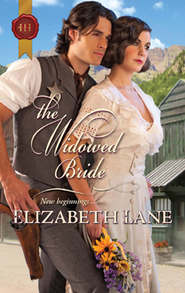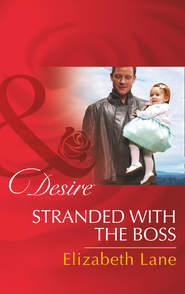По всем вопросам обращайтесь на: info@litportal.ru
(©) 2003-2024.
✖
The Borrowed Bride
Настройки чтения
Размер шрифта
Высота строк
Поля
Raking back his damp hair, he gazed out across the open pasture that separated the Seavers ranch from the Gustavson farm. In the distance someone was moving—a dot of blue seen through the shimmering air, coming closer. Judd’s throat tightened as he remembered the Gustavson girl—Quint’s girl—racing down the platform after the departing train. He could still see her losing ground, faltering, then turning back with stricken cornflower eyes, as if her whole world had been crushed beneath the iron wheels.
Judd hadn’t seen her since that dismal morning. Nor had he heard from Quint. Maybe she’d received some news of him and was coming to share it.
He watched and waited. A bead of water trickled down his cheek to lose itself in the stubble of his unshaven chin. As the figure grew closer, Judd’s spirits sank. It wasn’t the girl after all. It was a woman, fairhaired and stoutly built. He recognized her as the mother of the Gustavson brood. She moved wearily, leaning forward as if harnessed to an invisible boulder that she was dragging behind her.
By the time Judd had unsaddled the horse and loosed it in the corral, Mrs. Gustavson had reached the front gate. Remembering his long-forgotten manners, he started down the road to greet her and escort her to the house. Even from a distance he could see that she was distraught. She walked with a dejected slump, dabbing at her eyes and nose with a wadded rag that served as a handkerchief.
At the sight of Judd, she straightened her posture, lifted her chin and jammed the rag into the pocket of her faded chambray dress. In her youth, she might have been as pretty as her daughter. But two decades of poverty, backbreaking labor and constant childbearing had taken their toll. Any beauty she’d possessed had worn away, exposing a core of toughness and raw Norwegian pride. Poor as she was, Mary Gustavson was a woman to be reckoned with.
Partway down the long, straight approach to the house, they met. Judd lifted the damp Stetson he’d replaced on his head. “Good day, Mrs. Gustavson.”
“Judd.” She nodded curtly. She had the kind of ruddy Nordic skin that stretched tight over the bones of her face. Her tearstained eyes were several shades lighter than her daughter’s. “I trust your mother is at home.”
“Yes.” Judd glanced at the sun, calculating the time. “She usually takes tea in the parlor at this hour. I’ll walk you to the door.” He offered his arm but she ignored the gesture. Her eyes were fixed on the well-built two-story house with its shuttered windows and gingerbread porch. Judd’s father had built the place fifteen years ago. The summer after his family moved in, Tom Seavers had been trampled to death in a cattle stampede. On hearing the news, his wife had suffered a disabling stroke.
In the intervening years, Edna Seavers had transformed the place into a mausoleum for the living. Judd couldn’t blame Quint for wanting to strike out on his own. He might have considered leaving himself. But this was home. He was needed here, especially now. And he had no other refuge when the nightmares came.
“Has your daughter heard anything from Quint?” he asked, making awkward conversation as they mounted the porch steps. Mary Gustavson did not reply. Her posture had gone rigid. Her face had taken on the stoic expression of a soldier marching into battle.
Judd reached out to open the door for her, but she brushed his hand aside, seized the heavy brass knocker and gave three sharp raps as if to announce her presence. The wooden floor on the other side creaked under the weight of heavy footsteps. The door swung inward.
The woman standing in the entry was built like a brick wall, her face so devoid of expression that it might have been cast in concrete. Gretel Schmidt had cared for Edna since the days following her stroke. She had also taken on the cooking, washing and housekeeping duties. What she lacked in beauty she made up in competence. Judd valued her service and paid her enough to keep her from seeking other work.
“Gretel, Mrs. Gustavson has come to see my mother,” he said. “I presume she’s in the parlor.”
“This way.” Gretel lumbered back down the paneled hallway toward the sitting room. Judd turned to go back outside, then hesitated. Mary Gustavson wouldn’t have come here on a social call. Something was wrong. If it concerned his family, he’d be well-advised to stay and listen. Tossing his hat onto a rack behind the door, he followed the two women down the hall.
The parlor’s tall windows faced east, offering morning sun and a fine view of the mountains. Edna Seavers had covered them with heavy drapes, which she kept drawn against the light. The well-furnished chamber was as gloomy as the inside of a funeral home.
Edna sat in her customary rocking chair, reading the Bible by the light of a small table lamp. Her ebony cane was propped against one arm of the chair. The stroke had weakened her left side. She could hobble around the house with the cane, but for ventures out she preferred the dignity of a wheelchair.
Was she any worse today? Judd studied her now, remembering what he’d learned from her doctor last month. His mother was more fragile than even she realized. But her will seemed as strong as ever.
She glanced up as Gretel entered to announce the visitor. Her bony little fingers laid the black marker ribbon across the page before closing the Bible. “Two cups of hot chamomile tea, Gretel,” she said. “Please have a seat, Mrs. Gustavson.”
Mary Gustavson lowered her ample frame onto the edge of a needlepoint chair. After her long trek in the sun, she would surely have preferred cold lemonade, or even water, to hot tea. But she sat in awkward silence, blinking as her eyes adjusted to the darkness.
Judd found a seat in a shadowed corner. He had no wish to be part of the drama, only to listen and observe.
“Have you heard from your boy Quint, Mrs. Seavers?” Mary spoke good English but with a thick Norwegian accent.
Judd could almost read the thoughts behind his mother’s disapproving frown. The tea had yet to arrive, and this uncouth woman had already brushed aside the social pleasantries and cut to the reason for her visit.
Judd stifled a groan as he realized what that reason must be. Only one thing would have brought Mary Gustavson to this house.
“As a matter of fact, I haven’t heard a thing,” Edna sniffed. “But why should my son be any concern of yours?”
Mary’s reply confirmed Judd’s guess. “Our Hannah is with child. I’ve no doubt that your son is the father.”
“How can you be sure?” Edna’s voice dripped acid. “For all you know, your daughter could have spread her legs for half the boys in the county. Just because we’ve got money, and because Quint isn’t here to defend himself—”
“Hannah is a good girl!” Mary was on her feet, pale and quivering. “If she lost her virtue, it was because she loved your son, and he took advantage of her.”
“My son is a gentleman. He would never take advantage of any girl.” Edna took a moment to pour a cup of the tea that Gretel had placed on the table. Her face was a mask of propriety but her hands were shaking. Tea sloshed onto the tabletop, staining the lace doily that covered it. “In any case, you’ve no proof of your accusation. Until Quint appears to answer for himself, there’s nothing I can do.”
“Then write him a letter! Tell him he has to come home!”
Edna set the teacup back on its silver tray, its contents untasted. “Nobody wants Quint home more than I do. I’ve written to him every week, begging him to abandon this silly adventure. But he hasn’t replied. I don’t know if my letters have even reached him. So you see, Mrs. Gustavson, whether I believe you or not, my hands are tied.”
“But this is your grandchild, your own flesh and blood!” Mary’s work-roughened hands twisted in anguish. “My Hannah and your Quint, they were sweethearts. There was nobody else for her. You know that. Soon the whole town will see the scandal. Do you want that for Quint’s child? To be born without a father? To be called always by that ugly word?”
Edna’s hand fluttered to her throat. “Really, Mrs. Gustavson, I don’t see—”
“You must get Quint home! My daughter needs a husband! Her baby needs a name!”
Edna had shrunk into her chair like a threatened animal. “But that isn’t possible. We don’t know how to reach him.”
“Then who is going to marry my Hannah?” Mary demanded. “Who is going to be a father to your son’s baby?”
“I will.”
Judd rose as he spoke the words. Shocked into silence, the two women stared at him.
“You?” Edna choked out the word. “But that’s preposterous!”
“Do you have a better idea?” Judd’s mind raced, the plan falling into place as he spoke. “The marriage would be in name only, of course. We could have the divorce papers drawn up ahead of time. When Quint gets home, all we’d have to do is sign them. Then he and Hannah would be free to marry.”
Mary Gustavson was gazing at him as if he’d just saved her family from a burning house. “Thank you,” she murmured.
Judd forced himself to meet her tearful gaze. He’d offered his help out of genuine concern. But what was he getting that poor girl into? Even on a temporary basis, he was no bargain for any woman. And no bride deserved a mother-in-law like Edna Seavers.
“Don’t thank me yet,” he said. “I’m willing to marry your daughter, Mrs. Gustavson, but Hannah needs to be willing, too. She needs to understand the conditions and agree to them.”
“She will. I’ll make sure of that.”
Judd glanced at his mother. Edna’s face was white with suppressed anger. Her lips were pressed into a rigid line. None of this was going to be easy. But he had to do the right thing for his brother’s child—and for that child’s grandmother. He turned back to Mary.
“If you don’t mind I’d like to ask Hannah myself. The least the poor girl deserves is a proper proposal.”
Mary looked hesitant. Her mouth tightened.
“I’ll come calling tonight, after supper. You can tell her to expect me.”
“Should I tell her the rest?”
“How much does she already know?”
“About this? Nothing. I told her I was going to visit a friend across the creek. But she’ll find out soon enough.”











